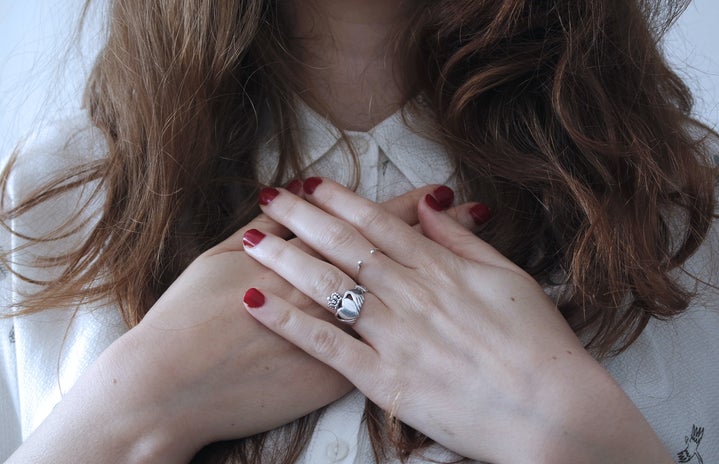TW: Discussion of sexual harassment, hate crimes, Asian hate, violence against Asians, violence against women
I was given an opal ring for my thirteenth birthday. With its large center stone and two pink sapphires to frame it, the ring probably cost more than my family’s rent at the time. My father opened the black velvet box from Kay Jewellers to me as if it were a proposal. And it was, in a sense. A proposal for me to pledge my chastity to God before I even had a firm grasp of sex and sexuality. This was a completely normal thing for middle school aged girls in my community. We would show off our rings at the playground without having the slightest idea of what they symbolized. I understood the ring was very important. I also understood deeply, better than I understood my multiplication tables, that not having sex was very important. In church, we were taught all sexual experiences before marriage were strictly forbidden and had spiritually damaging consequences. My church fostered a stressful and traumatic environment where the simplest human urges were repressed, monitored, and shamed. But this ideology was driven into the heads of the girls so much harder than into the boys. All responsibility of managing desire was placed exclusively on us girls.
This is what we understand to be “purity culture” a subculture of evangelical Christianity that peaked in the 1990s. It involves young girls pledging to their fathers to abstain from sex until marriage by wearing these “purity rings”, and it is still very present today. It forbids any sexual activity outside of marriage and places sole responsibility on women to manage the man’s sexual desires. Men are taught their minds are evil, whereas women are taught their bodies are evil. Women are responsible for the sexual thoughts, feelings, and choices men make, so we must dress, walk, and talk in just the right way to not inspire sexual thoughts, feelings, and actions. It is an extremely harmful mindset to individuals and society as a whole.
On March 16, 2021, Robert Aaron Long killed eight people, six of whom are of Asian descent. Specifically, Paul Andre Michels, Xiaojie Tan, Daoyou Feng, Delaina Ashley Yaun-Gonzalez, Elcias R Hernandez-Ortiz, Hyun Jung Grant, Soon Chung Park, and Suncha Kim, Yong Ae Yue were murdered at a spa in Cherokee County, Georgia. His reasoning? The 21-year-old claimed that he had a “sex addiction” and murdered the women to “eliminate temptation”. He was a youth member of Crabapple First Baptist Church and most likely indoctrinated by evangelical purity culture.
Sexual purity culture is deeply tied to white supremacy. Asian women have a deep history of being hypersexualized and fetishized. The Page Act of 1875 banned Chinese women from entering the country on the assumption alone that they were likely prostitutes. Following the hate crime, many Asian American women spoke up about the way they have been hypersexualized in purity culture in the past and how it has affected their lives.
“It is purity culture that enabled my evangelical Christian high school principal 10 years ago to tell me, a 14-year-old Chinese-born girl, to change out of my short dress to avoid tempting my male classmates and teachers,” said Flora Tang, a recent graduate of Harvard Divinity School.“I was encouraged to give ‘side hugs,’ because full-frontal hugs were very tempting to men, especially those who enjoyed meeting Asian women.”
Purity culture is highly problematic for everybody involved, but especially for Asian American women who are continuously sexualized in society. It is time for churches to remove stereotypes and purity culture and address the social structures of racialized misogyny. Acknowledging theological roots and its resulting history is a first step for churches to break their silence about issues of race, gender, and sexuality.
If you would like to write for Her Campus Mount Holyoke, or if you have any questions or comments for us, please email hc.mtholyoke@hercampus.com.

